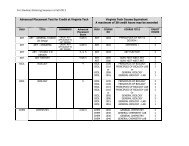VTSA Booklet - Virginia Tech Summer Academy
VTSA Booklet - Virginia Tech Summer Academy
VTSA Booklet - Virginia Tech Summer Academy
Create successful ePaper yourself
Turn your PDF publications into a flip-book with our unique Google optimized e-Paper software.
Jump-start<br />
first year<br />
your<br />
at the <strong>Virginia</strong> <strong>Tech</strong><br />
<strong>Summer</strong> <strong>Academy</strong>!<br />
<strong>Virginia</strong> <strong>Tech</strong><br />
<strong>Summer</strong> <strong>Academy</strong>
Students with disabilities who need reasonable accommodations are encouraged to contact<br />
Services for Students with Disabilities at 540-231-3788 or mailto:ssd@vt.edu<br />
<strong>Virginia</strong> <strong>Tech</strong> does not discriminate against employees, students, or applicants on the basis of<br />
age, color, disability, gender, national origin, political affiliation, race, religion, sexual orientation,<br />
or veteran status.<br />
1
what is virginia tech<br />
summer academy?<br />
<strong>Virginia</strong> <strong>Tech</strong> <strong>Summer</strong> <strong>Academy</strong> is an opportunity for first-year students<br />
to jump-start their <strong>Virginia</strong> <strong>Tech</strong> academic career in a small classroom<br />
environment.<br />
<strong>Virginia</strong> <strong>Tech</strong>, one of the top land-grant universities in the nation, with<br />
more than 31,000 undergraduate and graduate students can sometimes be a<br />
bit daunting for new students. Normally, first year students start in August<br />
during a regular semester and are immediately thrust into the university<br />
environment with the challenges of juggling academics, finding their way<br />
around campus, making new friends, and adjusting to life in the residence<br />
halls. <strong>VTSA</strong> is designed to ease your transition from high school to college<br />
by coupling required course work with opportunities to become familiar<br />
with university expectations, making new friends, and finding your way<br />
around campus and the Blacksburg community during a summer session<br />
without the flurry and crowds of a fall semester start-up. Research experts<br />
suggest that students who enroll in programs like <strong>VTSA</strong> have higher levels<br />
of satisfaction in personal adjustment, satisfaction with institutional choice,<br />
and a more enriching academic experience than nonparticipants. <strong>VTSA</strong><br />
combines popular courses, along with peer mentoring, to promote a solid<br />
foundation for the start of your academic life at <strong>Virginia</strong> <strong>Tech</strong>.<br />
<strong>VTSA</strong> takes place during <strong>Virginia</strong> <strong>Tech</strong>’s second summer session<br />
( July 6-August 16) and is available only to first year students. Students<br />
should apply as soon as possible. Space is limited in <strong>VTSA</strong>. Every effort will<br />
be made to fulfill each student’s preferred choice.<br />
how does vtsa work?<br />
As a <strong>VTSA</strong> student, you will select one academic “track.” A track typically<br />
consists of two-three-credit hour courses linked with students in both<br />
courses.<br />
2
what are the benefits of vtsa?<br />
Jump Start Your Path to Graduation – Get a few steps closer to reaching<br />
your goal of completing your undergraduate degree. Taking some of your<br />
general education requirements now helps you either to graduate early or<br />
have room for double majors or minors.<br />
Small Classes – Each track is limited to 24 students, allowing for greater interaction<br />
with faculty and other students. You take both classes with the same small<br />
group. The faculty members work to integrate material from the two courses.<br />
A Mentor for Each Track – An upper-level student is there to show you the<br />
way with study-skills sessions, library tours, computer assistance, tips about<br />
being successful at <strong>Virginia</strong> <strong>Tech</strong>, and engagement in out-of-class experiences.<br />
Workshops – In addition to taking courses, students will be engaged throughout<br />
the day in strategic workshops in time management, study skills, test taking,<br />
career development, strength assessment, and creating a plan of study.<br />
Library Resources – Librarians will be available to assist you in navigating<br />
through the vast resources of Newman Library. Developing research skills<br />
will be critical to your success in the university environment.<br />
3
Early <strong>VTSA</strong> Residence Hall Move-in – <strong>VTSA</strong> students live with each<br />
other in a designated residence hall. Beat the fall move-in rush. At the end<br />
of the summer session, <strong>VTSA</strong> students are allowed to move belongings to<br />
their assigned residence hall for fall.<br />
Orientation – Students attending <strong>VTSA</strong> will receive orientation while<br />
participating in <strong>Summer</strong> <strong>Academy</strong> and do not need to sign up for an orientation<br />
session. Staff members from New Student Programs will work with<br />
<strong>VTSA</strong> students during the six-week academy to provide the same information<br />
presented at orientation. Parents will receive orientation information at<br />
a special session offered the day prior to the start of <strong>Summer</strong> <strong>Academy</strong>.<br />
Hokie Camp – Hokie Camp welcomes new Hokies to <strong>Virginia</strong> <strong>Tech</strong> with<br />
the purpose of giving them an opportunity to have fun, make friends, and<br />
learn more about life at <strong>Virginia</strong> <strong>Tech</strong>. At camp, students will have<br />
opportunities for hands on service, Ut Prosim, <strong>Virginia</strong> <strong>Tech</strong>’s motto.<br />
Through Hokie Camp, new Hokies will begin finding their place in the<br />
Hokie Family! Hokie Camp is a three-day orientation experience that<br />
will take place at the W. E. Skelton 4-H Educational Conference Center.<br />
Students will ride buses from the <strong>Virginia</strong> <strong>Tech</strong> campus to the conference<br />
center, where they will stay in air-conditioned, furnished cabins. For more<br />
information about Hokie Camp, visit: www.hokiecamp.nsp.vt.edu.<br />
Federal Work Study Program – Seal the deal with a university for your fall<br />
employment position before everyone else arrives in August!<br />
4
if i am offered summer<br />
admission, am i automatically<br />
registered for vtsa?<br />
No. To participate in <strong>VTSA</strong>, you must register for one of the <strong>VTSA</strong> tracks<br />
described in the brochure.<br />
who should choose vtsa?<br />
<strong>VTSA</strong> is for you if you are a first-year student who wants a smooth transition<br />
into academic and social life at a large research university. The program<br />
is open only to first-year students admitted to <strong>Virginia</strong> <strong>Tech</strong> during the<br />
summer or fall terms and is offered only during the second summer session.<br />
how much does vtsa cost?<br />
Your total fees are based on the summer session tuition for the six credits of<br />
enrollment and the summer room and meal plan rates. Visit bursar.vt.edu<br />
for the most up-to-date tuition information. Co-curricular seminars and<br />
workshops are provided to <strong>VTSA</strong> participants at no additional cost.<br />
is financial aid available?<br />
<strong>Summer</strong> <strong>Academy</strong> aid does not<br />
yes. count toward your fall award.<br />
<strong>VTSA</strong> students interested in receiving consideration for financial aid must<br />
complete the 2013-14 FAFSA form. This form must be completed in addition<br />
to the 2014-15 FAFSA form associated with the upcoming academic year. You<br />
can complete the free FAFSA application online by visiting fafsa.ed.gov.<br />
To obtain in-depth guidance and information about your individual financial<br />
aid outlook at <strong>Virginia</strong> <strong>Tech</strong>, please visit University Scholarships and<br />
Financial Aid at finaid.vt.edu.<br />
6
VIRGINIA TECH SUMMER<br />
ACADEMY TRACKS<br />
Jump-start your <strong>Virginia</strong> <strong>Tech</strong> experience by becoming a part of a very caring and<br />
supportive environment by participating in the <strong>Virginia</strong> <strong>Tech</strong> <strong>Summer</strong> <strong>Academy</strong>.<br />
Courses designated, as “Area” are options in general education, required of all <strong>Virginia</strong><br />
<strong>Tech</strong> students. Choose from over 15 different tracks. To enroll in your preferred<br />
track, follow the instructions outlined here. (Link should go to the registration page).<br />
Transfer students: Please remember to check with your advisor for appropriate track<br />
registration. Tracks for transfer students are tracks 16 – 18.<br />
TRACK 1: Today’s Forecast: Sunshine with Lots of Maroon and Orange<br />
Atmospheric pressure, hydrology, climatology, forecasting, landforms, soils, and air<br />
masses are topics that will be covered in this track. In addition to studying theoretical<br />
models for understanding weather patterns, students also will have the opportunity<br />
to gain experience from local meteorologists.<br />
GEOS 3114: Introduction to Meteorology<br />
GEOG 1104: Introduction to Physical Geography<br />
TRACK 2: A World of Change<br />
What is going on in the world? This track focuses on geopolitical relationships,<br />
interdependence among nations, and human and physical patterns of major regions.<br />
Students will develop understandings of the historical and political conditions that<br />
assist in explaining contemporary international conflicts.<br />
HIST 1116: Introduction to U. S. History, (Area 3), 3 credits<br />
PSCI 2054: Introduction to World Politics, (Area 3, also in Area 7), 3 credits<br />
TRACK 3: Architecture and Design<br />
Are you an aspiring Architect, Interior Designer, Landscape Architect or Industrial<br />
Designer? If so, this track has been designed specifically for you. The two combined<br />
courses provide a total immersion experience into the world of architecture and<br />
design. In this track, you will be introduced to the learning environment and<br />
activities characteristic of Foundation Design Lab (ARCH 1015). Participants in<br />
this experience will also be exposed to ways of perceiving and recording the built and<br />
natural environment through travel around the region, and to transform their findings<br />
in ways that enhance their design education.<br />
(continues on next page)<br />
7
ARCH 1024: Design Thinking: Defying Preconceptions, 3 credits<br />
ARCH 1034: Seeing Design: Transforming Observations, 3 credits<br />
This track is recommended for Architecture, Interior Designer, Landscape Architect,<br />
Industrial Designer majors and University Studies students desiring to transfer to the<br />
architecture degree program.<br />
TRACK 4: Engineering Exploration<br />
Students are introduced to the profession and the College of Engineering in this<br />
experience. Upon completion of this track, students will be able to: collaborate with<br />
classmates to successfully complete a team design project; demonstrate the ability to<br />
use basic project management methods; write an effective engineering report using a<br />
standard format and prepare and present a professional presentation; graph numeric<br />
data and drive simple empirical functions; develop algorithms and implement<br />
computer programs for engineering analysts; and, produce and interpret drawings<br />
appropriate to various engineering disciplines including hand sketched and computer<br />
generated.<br />
ENGE 1024: Engineering Explorations to ENGE 1215:<br />
Engineering Foundations, 2 credits<br />
ENGE 2984: Engineering Success Seminar, 1 credit^<br />
STS 2054: Engineering Cultures, (Areas 2 & 7), 3 credits<br />
^This course does not satisfy a graduation requirement.<br />
TRACK 5: Engineering Mathematics<br />
Students are introduced to the profession and the College of Engineering in this<br />
experience. Upon completion of this track, students will be able to: collaborate with<br />
classmates to successfully complete a team design project; demonstrate the ability to<br />
use basic project management methods; write an effective engineering report using a<br />
standard format and prepare and present a professional presentation; graph numeric<br />
data and drive simple empirical functions; develop algorithms and implement<br />
computer programs for engineering analysts; and, produce and interpret drawings<br />
appropriate to various engineering disciplines including hand sketched and computer<br />
generated.<br />
ENGE 1024: Engineering Explorations to ENGE 1215:<br />
Engineering Foundations, 2 credits<br />
MATH 1225: Calculus of a Single Variable, (Area 5,), 4 credits<br />
8
TRACK 6: Nutrition, Foods, Exercise, and Sport<br />
Our society is continually confronted with the dynamic nature of human health.<br />
This track introduces students to the foundational principles of health and wellness.<br />
Participants will develop an understanding of the exciting fields of nutrition and sport<br />
science.<br />
HNFE 1004: Foods, Nutrition and Exercise, 3 credits<br />
HNFE 2984: Fundamentals of Sport Science, 3 credits<br />
This track is recommended for students in Human Nutrition, Foods and Exercise.<br />
HNFE 1004 is required for all HNFE majors; HNFE 2984 can be used as a<br />
controlled elective for HNFE majors who choose the Science of Food, Nutrition and<br />
Exercise option and as a free elective for HNFE majors who choose the Dietetics<br />
option.<br />
TRACK 7: Nutrition and Life Sciences<br />
Nutrition, foods, and exercise and their impact on life cycles are analyzed in this<br />
coupling of courses. Students in this track will explore connections between food<br />
human behavior, ecology, anatomy and physiology.<br />
BIOL 1106: Principles of Biology (Area 4), 3 credits<br />
BIOL 1116: Principles of Biology Lab (Area 4), 1 credit<br />
HNFE 1004: Foods, Nutrition and Exercise, 3 credits<br />
This track is recommended for students majoring in the life sciences. Participants<br />
will be exposed to practitioners in the health professions. These courses meet degree<br />
requirements for the Human Nutrition, Foods and Exercise major.<br />
TRACK 8: The Right Chemistry<br />
This track is designed to prepare students to be successful in introductory level<br />
chemistry courses. Students will develop the following understanding upon the<br />
completion of this track: the language of chemistry; the meaning and use of the<br />
mole, atomic theory and structure; the periodic table; chemical bonding, chemical<br />
reactions and equations; set up and solve word problems; familiarity with exponents<br />
and logarithms. This track prepares students for the computational foundation of<br />
chemistry.<br />
CHEM 2984: Chemistry Skills, 3 credits<br />
MATH 1014: Pre-Calculus and Trig, (Area 5), 3 credits<br />
9
TRACK 9: Chemistry for Life Sciences<br />
This track is designed to prepare students to be successful in introductory level<br />
chemistry courses. Students will develop the following understanding upon the<br />
completion of this track: language of chemistry; the meaning and use of the mole,<br />
atomic theory and structure; the periodic table; chemical bonding, chemical reactions<br />
and equations; set up and solve word problems; familiarity with exponents and<br />
logarithms. Examples from food and fiber system will be emphasized in this track.<br />
ALS 2984: Chemical Problems Skills for the Life Sciences, 3 credits<br />
AAEC 1005: The Economics of the Food and Fiber System, (Area 3), 3 credits<br />
TRACK 10: Business Information Systems<br />
Become proficient in your understanding of the fundamental concepts of business<br />
information systems, the hardware, and data resources used in business organizations<br />
in this track. Special attention is given to information systems security and software<br />
applications.<br />
ACIS 1504: Introduction to Business Information Systems, 3 credits<br />
(Required of all Business majors)<br />
SOC 1004: Introduction to Sociology, (Area 3), 3 credits<br />
TRACK 11: Healthy Minds and Bodies<br />
<strong>Virginia</strong> <strong>Tech</strong> was named the fittest campus in America! This track introduces<br />
students to holistic strategies for developing healthy minds and bodies, while taking<br />
on the challenges and demands of a university experience. Students will be exposed to<br />
Tai Chi and other wellness practices of the Far East.<br />
HD 2984: Mind & Body Practices, 3 credits<br />
PHS 1514: Personal Health, 3 credits<br />
10
TRACK 12: Animal and Poultry Sciences<br />
In this combination of courses, students will be introduced to foundational principles<br />
and practices associated with the animal sciences; receive hands-on training in basic<br />
animal husbandry skills; develop an understanding of careers in the animal sciences;<br />
and explore the connections between the agriculture that feeds us, the arts that<br />
sustain us, and the society in which we live.<br />
APSC 1454: Introduction to Animal and Poultry Sciences, 3 credits<br />
APSC 1464: Introduction to Animal and Poultry Sciences Laboratory, 1 credit<br />
APSC 2984: Introduction to APSC Undergraduate Research, 1 credit<br />
ALS 1004: Agriculture, the Arts and Society (Area 6), 1 credit<br />
This track is recommended for students interested in careers in the animal sciences,<br />
including veterinary medicine, animal agriculture, and companion animals. The lab<br />
course includes hands-on work with university-owned livestock and horses. The<br />
APSC courses are required for Animal and Poultry Sciences majors and the ALS<br />
1004 course fulfills the university’s Area 6 requirement.<br />
TRACK 13: Globalization in the Food Industry<br />
In this combination of courses, students will examine the economic objectives of<br />
producers and consumers of food and fiber products. Participants will also analyze<br />
global leadership models in the production and distribution of food products.<br />
AAEC 1005: The Economics of the Food and Fiber System (Area 3), 3 credits<br />
LDRS 1015: Exploring Citizen Leadership, 3 credits<br />
TRACK 14: Communicating in a World of Change<br />
Learning to communicate well is an essential skill in all professions. In the 21st<br />
century, we are bombarded with technological influences in how we communicate. In<br />
this track, students will examine sociological implications of speech and technology<br />
in academic settings, social media, and the public square while enhancing their<br />
professional communication skills.<br />
COMM 2004: Public Speaking, 3 credits<br />
SOC 1004: Introduction to Sociology, (Area 3), 3 credits<br />
12
TRACK 15: The Modern Drug Culture<br />
What are the learned and shared behavior patterns of the modern drug culture?<br />
How are these behavior patterns transmitted through language, common rituals, and<br />
customs? How do recent changes at the state level conflict with federal guidelines?<br />
Participants in this track will learn the facts about drug use, abuse, policies, and<br />
prevention while learning strategies for healthy minds and bodies.<br />
PHS 3534: Drug Education, 3 credits<br />
HD 2984: Mind & Body Practices, 3 credits<br />
Transfer <strong>Academy</strong> Tracks<br />
TRACK 16: Animal and Poultry Sciences<br />
In this combination of courses students learn the basic concepts of physiology and<br />
anatomy of domestic animals; develop an understanding of careers in the animal<br />
sciences; and explore the connections between the agriculture that feeds us, the arts<br />
that sustain us, and the society in which we live.<br />
ALS 2304 Physiology and Anatomy of Domestic Animals, 4 credits<br />
APSC 2984: Introduction to APSC Undergraduate Research, 1 credit<br />
ALS 1004: Agriculture, the Arts and Society (Area 6), 1 credit<br />
This track is recommended for students interested in careers in the animal sciences,<br />
including veterinary medicine, animal agriculture, and companion animals. The lab<br />
course includes hands-on work with university-owned livestock and horses. The<br />
APSC courses are required for Animal and Poultry Sciences majors and the ALS<br />
1004 course fulfills the university’s Area 6 requirement.<br />
TRACK 18: Individualized Transfer Track (I.T.T.)<br />
In consultation with departmental academic advisors, students in this experience are<br />
provided the opportunity to design a personalized track to meet specific academic<br />
needs. Students must enroll in a minimum of five credit hours. Note: six credit hours<br />
are required for financial aid consideration.<br />
TRACK 19: Engineering Discovery<br />
In this track, students will explore the development of engineering and its cultural<br />
roles in historical and cross-national perspectives. Students will examine the roles of<br />
engineers and engineering in popular life, development of national styles, changing<br />
values in engineering problem solving, and the effects of evolving forms of capitalism.<br />
This track is open to engineering and non-engineering majors.<br />
STS 2054: Engineering Cultures, (Areas 2 & 7), 3 credits<br />
MATH 1225: Calculus of a Single Variable, 4 credits*<br />
*This course is required for all engineering majors.<br />
13
Track Recommendations by<br />
College for Freshmen<br />
Any College/Major<br />
1, 2, 6, 7, 11, 13, 14, 15<br />
College of Agriculture and Life Sciences<br />
6, 7, 9, 12, 13, 14<br />
College of Architecture and Urban Affairs<br />
2, 3, 11, 13, 14, 15<br />
College of Engineering<br />
4, 5, 11, 14, 15<br />
College of Liberal Arts and Human Sciences<br />
1, 2, 6, 7, 8, 11, 13, 14, 15<br />
College of Natural Resources and Environment<br />
1, 2, 8, 9, 11, 13, 14<br />
College of Science<br />
1, 6, 7, 8, 9, 11, 13<br />
Pamplin College of Business<br />
2, 10, 11, 13, 14,15<br />
University Studies<br />
1, 2, 3, 5, 6, 7, 8, 9, 10, 11, 12, 13, 14, 15<br />
14
virginia tech summer academy<br />
registration instructions<br />
1 <strong>VTSA</strong> is designed for first-year students offered summer or fall<br />
admission. Students should apply as soon as possible. Space is limited in<br />
<strong>VTSA</strong>. Applications should be submitted not later than May 15, 2014.<br />
Every effort will be made to accommodate all students who request<br />
enrollment in the academy.<br />
2 Review the <strong>VTSA</strong> Tracks offered for this summer. Choose three tracks<br />
(in case your first choice is not available). Prior to registration, you will<br />
be notified (by June 1) of the availability of your track preferences. Please<br />
note that some tracks are available only to specific majors.<br />
3 Go to vtsa.registrar.vt.edu and click on “Application” to begin your enrollment<br />
process. Complete the application page and click “Submit.”<br />
4 Students experiencing difficulty in submitting the application electronically,<br />
are advised to contact the Office of University <strong>Summer</strong> Sessions at<br />
540-231-4879 or summer@vt.edu to make other application arrangements.<br />
5 Complete the 2013-14 FAFSA form. This form must be completed in<br />
addition to the 2014-15 FAFSA form associated with the upcoming<br />
academic year. You may complete the free FAFSA application online by<br />
visiting fafsa.ed.gov.To obtain in-depth guidance and information about<br />
your individual financial aid outlook at <strong>Virginia</strong> <strong>Tech</strong>, please send a<br />
note to University Scholarships and Financial Aid at finaid@vt.edu. In<br />
the subject line write, “<strong>Summer</strong> <strong>Academy</strong>.”<br />
contact us<br />
University <strong>Summer</strong> & Winter Sessions<br />
104 Burruss Hall<br />
800 Drillfield Drive (0717)<br />
Blacksburg, VA 24061<br />
Phone: 540-231-4879<br />
Website: vtsa.registrar.vt.edu<br />
E-mail: summer@vt.edu


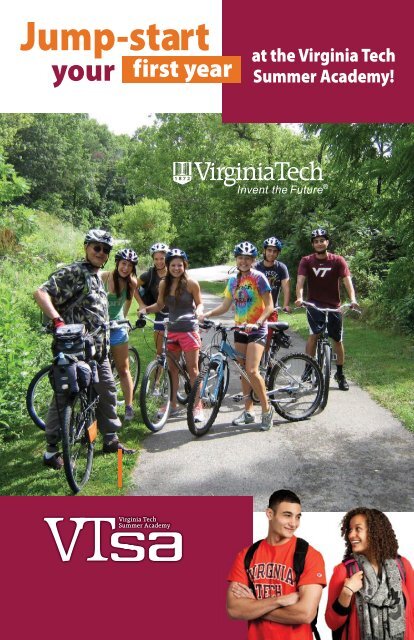
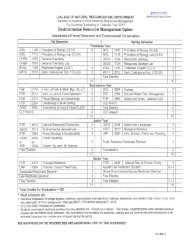

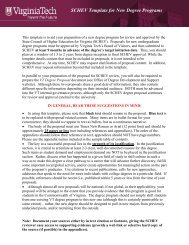
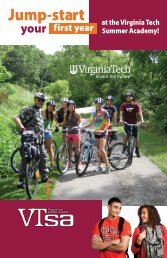
![(3) Computer Organization and Architecture [2504] - Office of the ...](https://img.yumpu.com/39899527/1/190x240/3-computer-organization-and-architecture-2504-office-of-the-.jpg?quality=85)

